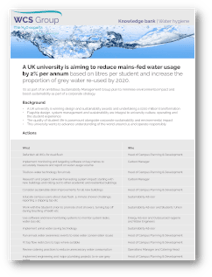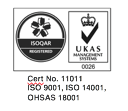
What you can do to save water, practical ways to save water, how to reduce water usage….are all questions operators of major sites – especially leisure and hospitality, food processing, commercial managers looking to enhance environmental objectives and reduce their carbon footprint and universities for example, eager to conserve resources and underline their green and sustainability credentials. Here is how one UK university has approached water efficiency with much success.
A UK university is aiming to reduce mains-fed water usage by 2% per annum based on litres per student and increase the proportion of grey water re-used by 2020. It’s all part of an ambitious Sustainability Management Group plan to minimise environmental impact and boost sustainability as part of a corporate strategy.

| What | Who |
|---|---|
| Refurbish all WCs for dual flush | Head of Campus Planning & Development |
| Implement monitoring and targeting software on key metres to accurately measure and report on water usage volume | Carbon Manager |
| Trial low-water technology for urinals | Head of Campus Planning & Development |
| Research and project rainwater harvesting system impact starting with new buildings and rolling out to other academic and residential buildings | Carbon Manager |
| Consider sustainable drain improvements for all new buildings | Head of Campus Planning & Development |
| Educate campus users about dual flush, 5-minute shower challenge, reporting a dripping tap etc | Sustainability Advisor |
| Work with the Student Union to promote short showers, turning tap off during brushing of teeth etc | Sustainability Advisor and Students’ Union |
| Use software and new monitoring systems to monitor system leaks, water loss etc | Energy Advisor and Outsourced Hygiene and Water Engineers |
| Implement urinal water saving technology | Sustainability Advisor |
| Run annual water awareness events to raise water conservation issues | Head of Campus Planning & Development |
| Fit tap flow restrictors to taps where suitable | Head of Campus Planning & Development |
| Review catering practices to reduce unnecessary water consumption | Operations Manager and Catering Head |
| Implement engineering and major plumbing projects to re-use grey water | Head of Campus Planning & Development |
| Elicit help of teaching and undergraduates to monitor and introduce new water saving techniques alongside specialist hygiene advisors | Outsourced Hygiene and Water Engineers |
WCS Group would like to wish this university and all stakeholders involved the very best of luck dealing with water usage, water safety and reductions in usage and environmental footprint. Many UK universities are investing in transformative programmes surrounding infrastructure, facilities and campus experience and receiving practical help and support from specialists regarding water treatment, water hygiene, operational efficiency, asset management maintenance life cycle planning and extension and ROI on capital asset expenditure.
If you would like help or to see our 40-point checklist on how you can reliably save water across your site(s), please email alex.winter@wcs-group.co.uk and ask for a checklist. It includes roles and responsibilities by stakeholder (Estates Office, Maintenance or Facilities, Water Hygiene or Water Treatment company) for example.
WCS Group is a water treatment, hygiene and compliance critical services specialist. We plan, manage and ensure safe water, heating and air systems operate across academic and residential buildings for more top-50 UK universities than anyone else. Currently, we manage and ensure safe, clean water for over 900 schools across the UK and over 50 of the top-100 UK universities. For more, see sector expertise.


















WCS Group is a trading name for WCS Environmental Ltd, registered in England and Wales (Number 02184649) at 20 Grosvenor Place, London, SW1X 7HN. Head Office – 17 Wheatstone Court, Waterwells Business Park, Gloucester, GL2 2AQ. WCS Group is a Marlowe Critical Services Company owned by Marlowe plc. 2021© WCS Environmental Ltd.